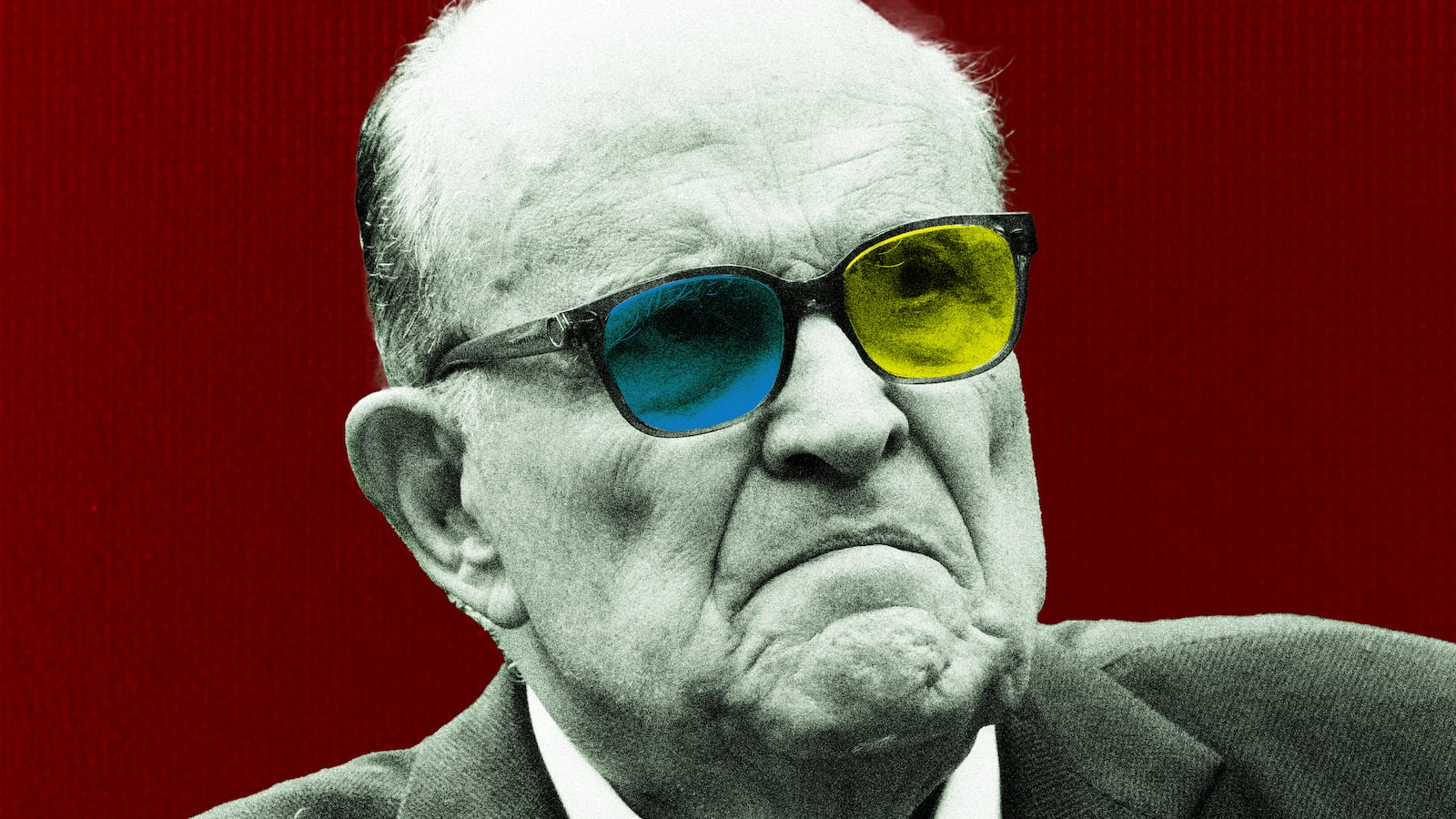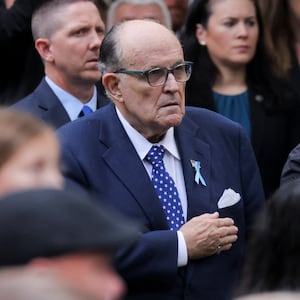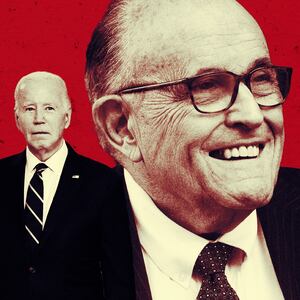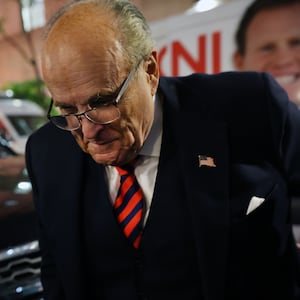Years before Rudy Giuliani’s world came apart over his efforts to overturn the 2020 election, the New York Attorney General’s Office briefly considered investigating the disgraced lawyer over his shadow diplomacy in Ukraine for then-President Donald Trump, according to emails reviewed by The Daily Beast.
Last week, the Manhattan District Attorney’s Office received emails detailing internal discussions at the AG’s office back in early 2020 about the potential investigation—which apparently went nowhere. While these emails show that lawyers working for the AG discussed an investigation, the idea was shot down quickly, according to an agency official familiar with the matter who would only speak on condition of anonymity.
The proposed plan, laid out in a law enforcement memo dated Jan. 7, 2020, “recommends that the Attorney General open a civil investigation into whether Rudolph William Giuliani is unlawfully practicing law in violation of New York’s Judiciary and Executive Laws—as appears to be highly likely.” It suggested using Executive Law 63(12), the same sweeping authority Attorney General Letitia James is now using against Trump at his ongoing bank fraud trial.
The idea was to probe the Trump administration’s unfurling Ukraine scandal, in which Giuliani—as Trump’s personal lawyer—traveled to the Eastern European country to dig up dirt on Hunter Biden in a bungled attempt to thwart his father’s presidential campaign. But by the time the AG’s office was discussing the matter, the world had already learned about the infamous July 2019 phone call between then-President Trump and Ukrainian President Volodymyr Zelensky, in which Trump seemed to threaten withholding military aid against Russia with a quid pro quo when he said, “I want you to do us a favor though.”
Top brass at the AG’s office examined the memo’s proposals, which included investigating Giuliani for “conspiracy to abuse government power for personal gain” and “obstruction of Congress and justice.”
The timing of the discussions was critical, as Trump was actively being impeached in the House of Representatives and awaiting trial in the Senate. The proposed law enforcement effort sought to overcome a blockade put forward by MAGA-loyal Republicans, who did not want to hear additional evidence and ultimately blocked witnesses from testifying.
“Expedited investigative action could compel Giuliani to give sworn testimony prior to a verdict in the U.S. Senate trial,” the memo suggested, arguing that “the factual bases for investigating Giuliani’s practices as a New York attorney overlap almost completely with the articles of impeachment against Trump.”
Have a news tip for The Daily Beast? Send it to tips@thedailybeast.com.
The Daily Beast reviewed emails discussing the matter in which the memo’s author, John Oleske, a senior enforcement counsel at the office, suggested the AG was uniquely positioned to supplement the historic impeachment effort because the AG has “explicit statutory power to investigate and prosecute criminal and civil actions against NY attorneys who practice law unlawfully [including]… instances where lawyers are ‘guilty of any deceit or collusion.’”
The second-highest ranking lawyer at the AG’s office, First Deputy Attorney General Jennifer Levy, would later respond by email.
“I’m looking at the judiciary law. It’s an interesting idea,” she said.
However, that idea got robust pushback from another top attorney in that office, Travis Hill, who led the Public Integrity Bureau at the time. Hill laid out his counterargument to Levy and the head of the AG’s criminal division, Jose Maldonado, in a memo dated Jan. 8, 2020.
Hill described his analysis this way: “This is a discussion of whether the OAG’s jurisdiction to bring such actions includes investigations intended to determine whether actions of an attorney properly licensed in the State of New York are within the authorized bounds of legal practice.”
Hill questioned the proposed use of Judiciary Law § 476-a, arguing that it really only allowed the AG to target non-lawyers from trying to practice law in New York—noting the way that provision has traditionally been used to clamp down on swindlers posing as immigration attorneys.
“Additionally, to my knowledge, the OAG has never prosecuted a licensed attorney, either civilly or criminally, for the breadth of his/her practice,” Hill wrote, later concluding that “such prosecution, whether civil or criminal, would be unprecedented and contrary to the purpose of the statute.”
In the end, the AG’s office did not follow through with the proposed plan. The agency official who spoke to The Daily Beast on background described it as an “unsolicited” idea, stressing that it came from an attorney who wasn’t involved in Trump investigations. “This was never a serious consideration at all, not remotely,” this person said.
And on Friday, an AG spokesperson issued a statement to The Daily Beast claiming the office “does not have the legal authority to look into this matter, so it was never pursued.”
A notable part of the internal proposal also touched on some legal drama that would later pop up in the Manhattan DA’s eventual criminal case against Trump for faking business records to cover up his hush money payment—a scheme to hide his one-night affair with porn star Stormy Daniels. It’s a case that relies, in part, on testimony from Trump lawyer-turned-sworn enemy Michael Cohen.
When the feds went after Cohen for his role in making that payment—and long before Cohen agreed to help the DA investigate this—there was an attempt to form a backchannel between Cohen and the Trump White House via Giuliani, who was then Trump’s personal lawyer. That job was entrusted to Giuliani’s own lawyer, Bob Costello, who briefly advised Cohen and tried but failed to keep him in line.
Oleske’s memo suggested investigating Giuliani for the backchannel misadventure, and floated the idea of subpoenaing Costello, too.
Reached on Friday, Costello was incensed that anyone would even suggest roping him into this.
“Subpoenaing ME????” he responded via text message, calling the mere notion “laughable.”
Costello went on to defend Giuliani’s mission in Ukraine, noting that he and Giuliani traveled to Pittsburgh in January 2020—at around the same time this AG discussion was going on—to share what they considered damning information about Hunter Biden with U.S. Attorney Scott Brady, an investigation that continues in some respects to this day.
A spokesman for Giuliani did not provide comment for this story.
These AG internal discussions to hold Giuliani accountable came long before other organizations—without law enforcement authority—would scramble to do whatever they could.
Giuliani, undeterred by Trump’s impeachment and emboldened by the Senate’s refusal to convict the president in 2020, continued his work to undermine Joe Biden’s presidential campaign later that year. He became a top lieutenant in Trump’s efforts to question the 2020 election, serving as his personal lawyer in Georgia while the MAGA campaign made unfounded allegations of widespread voter fraud—spreading dangerous lies about poll workers that later got him nailed in federal court for defamation.
At the AG’s office, emails show that Oleske resurfaced his proposal in mid-November, shortly after the presidential election in which Trump refused to acknowledge his loss—and had Giuliani and others try to overturn the results. Oleske titled the email, “Hizzoner,” a cheeky reference to big city mayors usually employed by journalists.
“Had to pipe up again that now rudy is actually lying to federal judges in an actual legal proceeding,” Oleske wrote.
At that point, the No. 2 at the office shut it down for good, noting that the AG’s office wouldn’t take this on. The Public Integrity Bureau and the office’s Appeals and Opinions Bureau, which prepares civil and criminal appeals, weren’t on board.
“Unfortunately, I vetted your analysis with PIB and A&O and they didn’t think we could state a credible claim. It was certainly a creative idea ‐ thank you,” Levy wrote back.
Giuliani’s crusade reached its climax at Trump’s assembly of MAGA loyalists at the Ellipse park south of the White House on Jan. 6, 2021, when Giuliani delivered a rallying cry. “Let’s have trial by combat!” Giuliani shouted, just before the crowd stormed the Capitol.
It was only after that attack that professional institutions without government authority took action. Immediately following the insurrection, the New York State Bar Association launched its own inquiry. In a statement at the time, the Bar Association called it a “historic” decision, noting that “we cannot stand idly by and allow those intent on rending the fabric of our democracy to go unchecked.” Six months later, a panel of five state appellate judges suspended his law license in New York for “demonstrably false and misleading statements” about the 2020 election result.
The District of Columbia bar quickly followed up with its own suspension, with the disciplinary counsel later saying Giuliani had “weaponized his law license.”
It wasn’t until August this year that Giuliani finally got hit hard, when Fulton County District Attorney Fani Willis convinced a grand jury to indict him on more than a dozen criminal counts for allegedly taking part in a mob-like racketeering conspiracy along with Trump and 18 others to overturn Georgia’s election.
AG Letitia James is now a full month into her historic civil trial against Trump, who’s been accused of bank fraud and could lose his real estate empire—along with $250 million or more. The legal action, which is set to continue through the end of December, is the first of many that threaten to derail the leading Republican 2024 presidential candidate’s aspirations to return to the White House.










